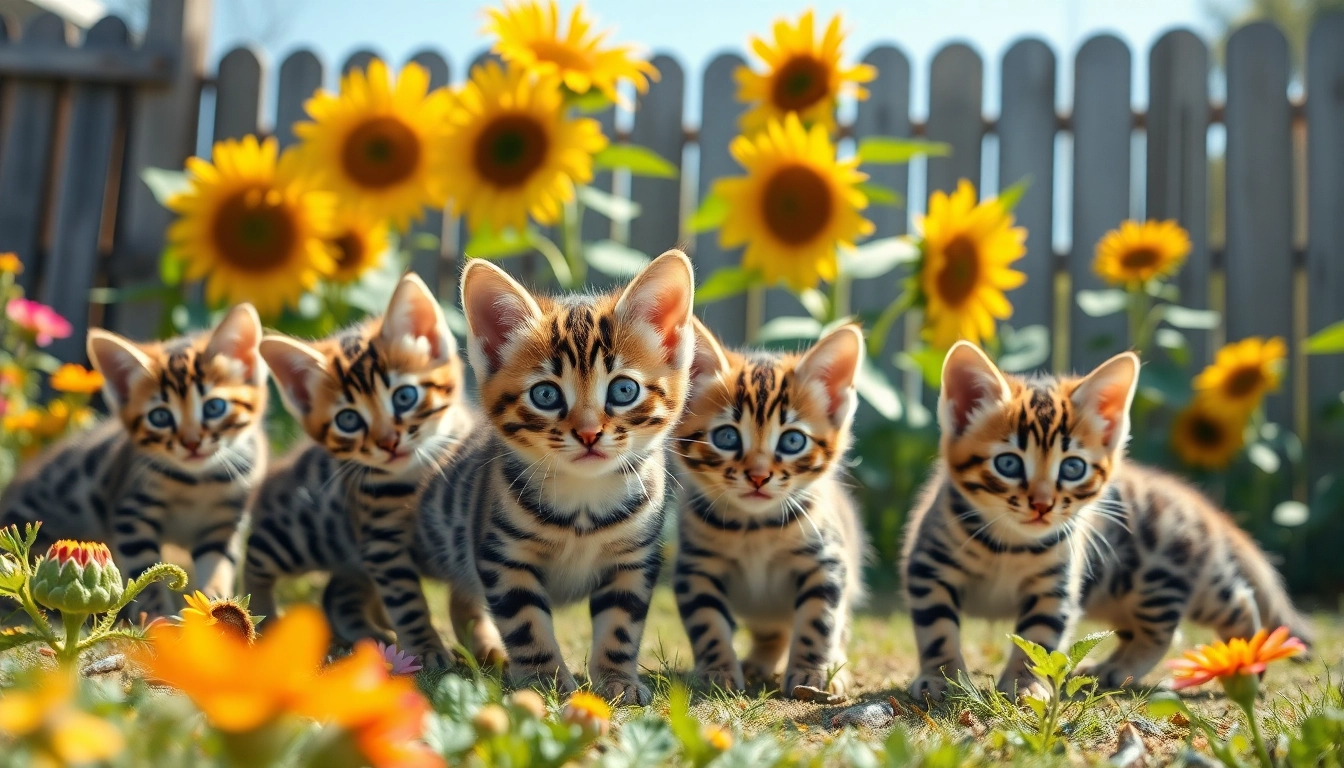Understanding the Bengal Breed
The Bengal cat, a domestic feline known for its extraordinary appearance resembling that of a wild leopard, has gained immense popularity among cat enthusiasts. This breed is not just visually stunning; it boasts a unique personality and intelligence that makes them an intriguing addition to any household. As you explore Bengal breeders Orange County, understanding the key characteristics of Bengals, as well as their temperament and health considerations, can help you make an informed decision about bringing one into your family.
Characteristics of Bengals
Bengal cats are often recognized for their distinctive coats adorned with large rosettes and spots, reminiscent of their wild ancestors. Their coats come in various colors, including brown, snow, and silver, and are known for being soft and luxurious, featuring a shimmering quality referred to as “glitter.” Bengals also possess a muscular build, long legs, and a thick tail, creating a striking and athletic appearance.
Besides their aesthetic appeal, Bengals are highly active and playful. They require plenty of physical activity and interactive playtime to satisfy their energy levels. This makes them ideal companions for active households where they can engage in climbing, running, and other forms of play. They’re known for their exceptional agility and curiosity, often needing a stimulating environment to thrive.
Temperament and Behavior
The temperament of a Bengal cat is one of their most compelling attributes. They are known to be affectionate and loyal, forming strong bonds with their human companions. Bengals are social cats and often enjoy the company of other pets and children, making them suitable for families. Their playful nature means they will entertain themselves and their family members for hours. Additionally, Bengals can be quite vocal, expressing their needs and desires through a variety of sounds.
While Bengals are friendly and sociable, potential owners should be aware that their high intelligence requires mental stimulation. Environments that lack interactive toys, climbing structures, and diverse play options may lead to boredom and unwanted behavior, such as excessive chewing or scratching.
Health Considerations for Bengals
Understanding the health considerations associated with Bengal ownership is essential. Like any breed, Bengals can be prone to certain genetic health issues, including hypertrophic cardiomyopathy (HCM), a heart condition that can affect their lifespan and overall quality of life. Responsible breeders conduct health screenings to minimize the risk of hereditary diseases; thus, choosing a reputable breeder is vital.
Bengals also require regular veterinary care, including vaccinations, dental care, and routine health check-ups. Owners should pay close attention to their diet, ensuring they receive high-quality nutrition tailored to their age, size, and activity level. Proper care and early detection of health issues can help ensure a long, healthy life for your Bengal.
Finding Bengal Breeders in Orange County
When searching for a Bengal kitten, it is crucial to find a reputable breeder. The right Bengal breeder not only offers healthy kittens but also provides insight into the breed’s characteristics, behavior, and care requirements. In Orange County, several catteries specialize in Bengals, each with its unique reputation and breeding philosophy.
Local Catteries to Explore
Orange County hosts a number of Bengal breeders committed to ethical breeding practices and the overall well-being of their cats. Here are a few noteworthy catteries to explore:
- Baby Bengals: Known for their TICA-registered Bengals, Baby Bengals focuses on producing cats with champion bloodlines and excellent temperaments. Their kittens are carefully nurtured in a loving environment.
- Bengal Babies: Located in Newport Coast, this cattery emphasizes the importance of socialization, ensuring that kittens are well-adjusted and friendly. They also prioritize health testing and provide a wealth of information to potential buyers.
- Purfect Pride Bengals: This breeder encourages prospective owners to visit and meet the kittens in person. They pride themselves on responsible breeding and maintaining strong bloodlines.
Evaluating Breeder Reputations
Researching and evaluating breeders is a vital step in finding the right Bengal kitten for you. Start by checking online reviews and testimonials from previous customers. Reputable breeders should have a history of satisfied clients who can vouch for the health and temperament of their kittens.
Additionally, reach out to breeders with any questions or concerns you may have. A responsible breeder will be more than willing to provide details about their breeding practices, health screenings, and will generally be committed to the welfare of their cats. It’s also vital to ask about the socialization process used for their kittens, as this can significantly influence your future cat’s behavior.
Questions to Ask Potential Breeders
When meeting with potential Bengal breeders, it’s important to come prepared with a set of questions to ensure you are making an informed choice. Here are some key questions to consider:
- What health tests have the parents undergone, and can you provide documentation?
- How do you socialize your kittens, and what training do they receive prior to going to their new homes?
- Can you provide references from previous clients?
- What kind of support do you offer to new owners after they take their kitten home?
- What is your return policy if unforeseen circumstances arise?
These questions can help assure you that you are dealing with a responsible breeder dedicated to producing healthy, well-raised Bengal kittens.
What to Expect When Getting a Bengal Kitten
Bringing a Bengal kitten into your home is an exciting experience, but it also comes with responsibilities. Understanding what to expect in terms of care, socialization, and long-term commitment will help you prepare for your new feline companion.
Initial Care and Nutrition
As with any new pet, the first few weeks with your Bengal kitten are crucial for establishing routines and ensuring proper care. Start by setting up a safe, comfortable space for your kitten to acclimate to their new environment. This should include a cozy bed, litter box, food and water dishes, and engaging toys to keep them mentally stimulated.
Nutrition plays a critical role in your kitten’s development. Select a high-quality brand of kitten food formulated for their specific needs, containing essential nutrients for growth. It’s also a good idea to consult with your veterinarian to develop a dietary plan that supports your Bengal’s health.
Socializing Your New Kitten
Socialization is essential for Bengal kittens to develop into well-adjusted adults. Allow your kitten to explore your home while ensuring they are safe and secure. Gradually introduce them to various environments, sounds, and experiences. Positive reinforcement—such as treats and praise—can encourage your kitten to explore and interact confidently with their surroundings.
It’s also beneficial to engage your kitten with other pets, provided they have been properly introduced and are comfortable with each other. This ensures that your Bengal develops sociable behavior and enjoys their interactions with other animals.
Lifespan and Long-Term Commitment
The average lifespan of a Bengal cat can range from 12 to 16 years, with some living even longer with proper care. This longevity means potential owners should be prepared for a long-term commitment. Owning a Bengal implies not only providing for their daily needs, including feeding, grooming, and veterinary care, but also considering their social and emotional well-being.
Before bringing a Bengal into your home, consider your lifestyle and ability to care for a cat throughout its lifespan. Bengals thrive in environments where they receive ample attention, mental engagement, and physical activity.
Tips for First-Time Bengal Owners
Owning a Bengal cat for the first time can be a rewarding experience, but it comes with unique challenges. Understanding their behavior and providing an appropriate environment can help ensure a successful transition into your home.
Creating a Kitten-Friendly Home
Creating a welcoming environment for your Bengal kitten is crucial. Begin by cat-proofing your home—this includes removing any potentially harmful household items, securing loose wires, and ensuring windows and balconies are safe. Provide vertical spaces like cat trees and shelves, as Bengal cats love to climb and observe their surroundings from high vantage points.
Ensure that all areas accessible to your kitten are safe and free from hazards. Combining safety with entertainment—such as toys that encourage mental stimulation—can help prevent boredom and destructive behavior in your Bengal.
Understanding Bengal Behavior
Bengals are known for their energetic nature, and understanding their behavior can assist in managing their needs. They may exhibit playful bursts of energy, so having interactive toys that encourage their instinct to hunt and play is essential. Engaging them with puzzle toys or feather wands can provide both physical and mental enrichment.
Notably, Bengals can show quirky, unique traits. For instance, many Bengals enjoy playing in water, unlike most cats. They may also have specific preferences for types of play or activities. Observing their behaviors can help you adapt your playstyle and interaction methods to suit their individual personalities.
Training Tips for Bengals
Training a Bengal can be an enjoyable experience, as their intelligence makes them quite capable of learning commands and tricks. Begin with basic commands such as “sit,” “come,” and “stay.” Use positive reinforcement methods, rewarding your kitten with treats or affection immediately following desired behaviors.
Establishing a regular routine can help with training. Bengals thrive on consistency, so try to stick to regular feeding and playtimes, reinforcing their training and expectations. If challenges arise, patience and perseverance are key. Bengals may take longer to learn specific skills, but with consistent effort, you’ll see results.
The Importance of Responsible Breeding
With the increasing popularity of Bengal cats, the need for responsible breeding has become more crucial than ever. Understanding ethical practices in breeding, recognizing TICA registrations, and tapping into community resources can significantly impact the quality of Bengals being bred.
Ethical Practices in Bengal Breeding
Ethical breeding involves a commitment to the health and well-being of the cats involved. Responsible breeders prioritize the welfare of their cats by conducting health screenings, managing breeding pairs for genetic diversity, and ensuring all kittens are raised in a nurturing environment. They should be open about their breeding practices and willing to educate prospective owners about the Bengal breed.
It’s essential to ask potential breeders about their breeding protocols and the steps they take to ensure the health and temperament of their kittens. A reputable breeder will advocate for the breed and will be dedicated to placing their kittens in loving, suitable homes.
Recognizing TICA Registrations
The International Cat Association (TICA) is one of the most recognized organizations for cat breed standards and registrations. Choosing a breeder that is TICA registered indicates that they adhere to the organization’s breeding policies and ethical practices, ensuring higher standards for the welfare of the cats.
A reputable TICA breeder will provide you with documentation confirming the registration of your kitten and the lineage of their breeding line, which adds credibility to the quality of the animal you are adopting.
Community Resources and Support
Joining community groups, online forums, and local clubs dedicated to Bengal cats can be an invaluable resource for both new and experienced owners. These communities provide platforms to share experiences, seek advice, and connect with others who share a passion for the breed.
Additionally, many organizations and resources offer guidance on Bengal care, training, and health. Whether it’s information on best feeding practices or tips for socialization, tapping into support networks can enhance your experience as a Bengal owner.
In conclusion, owning a Bengal cat can be an enriching experience filled with companionship, playfulness, and admiration. By conducting thorough research, understanding the characteristics of the breed, and engaging with reputable breeders, potential owners can find the perfect Bengal kitten to complement their home. Responsible ownership fosters a nurturing environment for these extraordinary cats and ensures a lasting bond with your new furry friend.











Leave a Reply